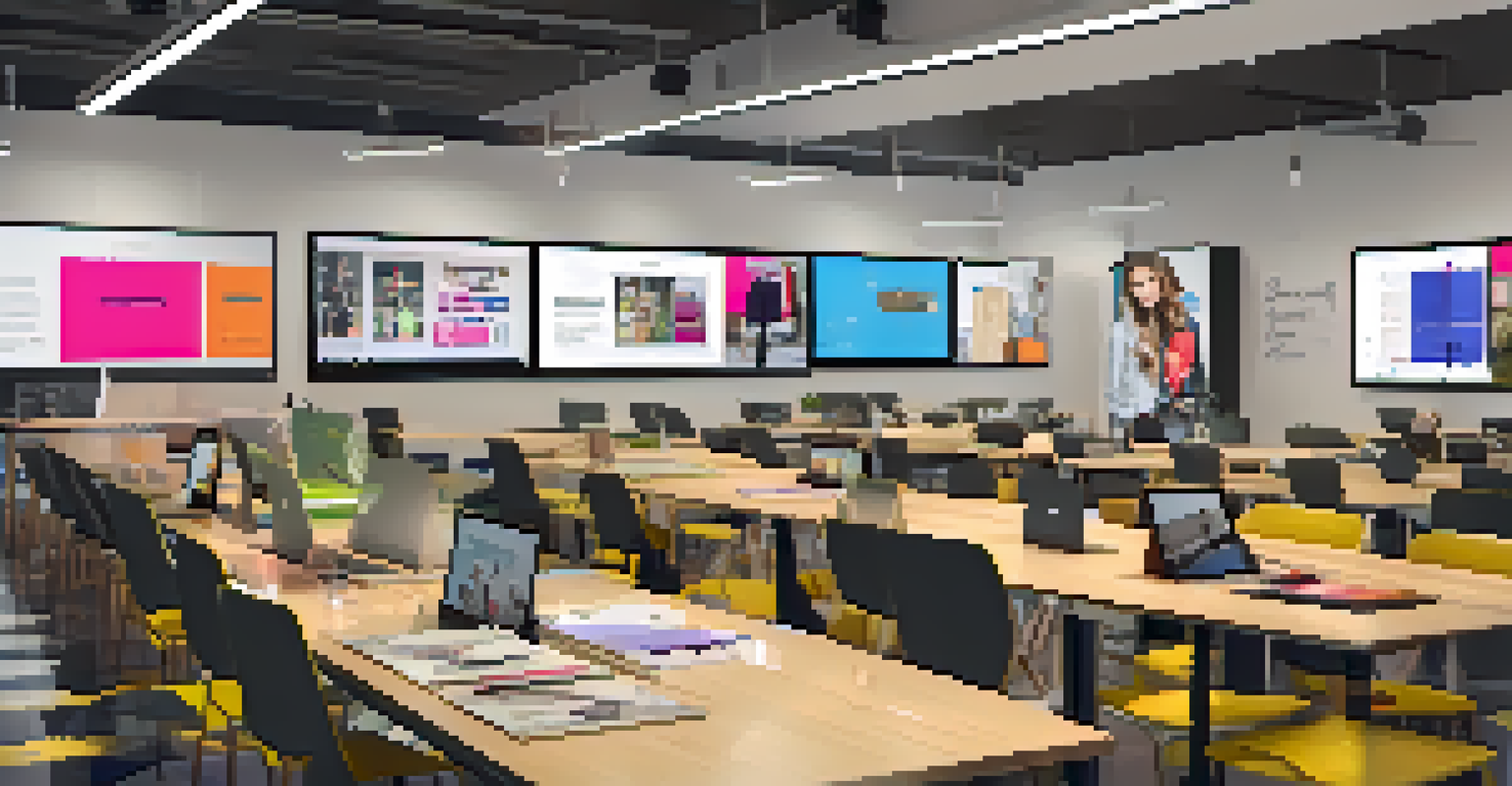Top Fashion Degrees for Aspiring Industry Professionals

Understanding the Importance of a Fashion Degree
A fashion degree can be a game changer for aspiring industry professionals. It not only provides foundational skills but also opens doors to networking opportunities in a competitive field. With the industry's rapid evolution, having formal education can set you apart from the crowd.
Fashion is the armor to survive the reality of everyday life.
Many think that creativity alone suffices in fashion, but a degree equips you with technical knowledge and business acumen. From understanding textiles to mastering fashion marketing, these programs cover essential aspects of the industry. It’s about blending artistry with practicality.
Moreover, a degree can enhance your credibility when starting out. Employers often look for candidates with formal education as it signals a commitment to the craft. In a field where trends change rapidly, having that solid foundation can help you adapt and thrive.
Bachelor's Degree in Fashion Design: The Creative Foundation
A Bachelor's in Fashion Design is often the most recognized path for aspiring designers. This program focuses on developing skills in sketching, draping, and pattern making, which are crucial for creating unique outfits. Through hands-on projects, students learn to bring their visions to life.

Students often engage in internships, providing invaluable real-world experience and networking opportunities. These experiences can lead to job offers and connections with industry professionals. They also give students a taste of the fast-paced work environment they can expect after graduation.
Fashion Degrees Boost Career Prospects
A fashion degree not only provides essential skills but also enhances credibility and networking opportunities in a competitive industry.
Additionally, many programs encourage collaboration with peers, which fosters creativity and innovation. Working alongside fellow budding designers helps in exchanging ideas and pushing creative boundaries. This collaborative spirit is vital in a field that thrives on trends and fresh concepts.
Fashion Merchandising: Bridging Design and Retail
For those drawn to the business side of fashion, a degree in Fashion Merchandising might be the perfect fit. This program focuses on understanding consumer behavior, marketing strategies, and retail management, essential for successfully selling fashion products. It’s about making sure the right products reach the right consumers.
Sustainability is about the future, and the future is about all of us.
Courses often cover topics like trend analysis and product development, helping students grasp what sells in the market. This insight is crucial for anyone looking to work in retail buying or product management. Understanding the cycle of fashion from design to shelf is a key takeaway.
Moreover, many programs include practical experiences through internships at retail companies. These internships provide a glimpse into the fast-paced world of fashion retail, and they often lead to job placements after graduation. This blend of theory and practice sets graduates up for success in various roles.
Bachelor's Degree in Fashion Marketing: Selling Style
Fashion Marketing combines creativity with strategic thinking, making it an exciting option for many. This degree covers marketing principles, brand management, and consumer psychology, all tailored to the fashion industry. It prepares students to promote fashion products effectively and creatively.
Students learn to develop campaigns that resonate with target audiences, using social media and digital marketing strategies. Given the rise of e-commerce, understanding online marketing is essential for anyone in this field. Graduates often find themselves at the forefront of brand storytelling and engagement.
Hands-On Experience is Crucial
Internships and practical projects are vital components of fashion programs, offering students real-world experience and valuable industry connections.
Additionally, internships play a pivotal role in this program, allowing students to apply their learning in real-world scenarios. From assisting in fashion shows to managing social media accounts for brands, these experiences are invaluable. They also help students build a portfolio that showcases their marketing prowess.
Fashion Communication: The Art of Storytelling
Fashion Communication focuses on the storytelling aspect of the industry. This degree helps students develop skills in writing, photography, and digital media, which are essential for conveying a brand's message. It’s about crafting narratives that connect with consumers on an emotional level.
Students often work on projects that involve creating fashion editorials or managing brand communications. This hands-on experience helps them understand how to present a brand's identity effectively. In an industry where perception is key, mastering communication techniques is crucial.
Moreover, given the rise of social media, this program prepares students for the ever-evolving digital landscape. Learning how to engage audiences through various platforms is essential for a successful career. Graduates often find opportunities in PR, social media management, and fashion journalism.
Sustainable Fashion Degrees: A Growing Trend
As sustainability becomes increasingly important, degrees focused on sustainable fashion are gaining traction. These programs teach students about eco-friendly materials, ethical sourcing, and sustainable production methods. It’s an exciting field for those passionate about making a positive impact in the fashion world.
Students learn to balance creativity with responsibility, ensuring that their designs consider environmental impact. This knowledge not only prepares them for current industry demands but also positions them as leaders in the movement towards sustainability. The future of fashion hinges on this shift.
Sustainability is the Future of Fashion
Degrees focused on sustainable fashion are increasingly important, equipping students with the knowledge to create eco-friendly and ethical designs.
Moreover, many programs offer opportunities to collaborate with brands focused on sustainability, giving students real-world insights. These experiences can be incredibly rewarding, as students contribute to meaningful projects. Graduates often emerge as advocates for change in an industry that desperately needs it.
Fashion Technology: Merging Creativity with Innovation
Fashion Technology is an emerging field that blends design with technological advancements. Degrees in this area often cover topics like 3D modeling, fashion tech innovations, and wearable technology. It’s an exciting space for those who want to push the boundaries of traditional fashion.
Students learn how to use technology to enhance the design process and create innovative solutions for the industry. This could mean anything from designing smart clothing to utilizing virtual reality in fashion shows. The intersection of fashion and technology is where creativity meets functionality.

Additionally, many programs encourage collaboration with tech companies, providing valuable networking opportunities. These connections can lead to internships and job offers in a rapidly growing sector. Graduates are often at the forefront of revolutionizing how we experience fashion.
Choosing the Right Fashion Degree for You
With so many options available, choosing the right fashion degree can feel overwhelming. It’s essential to reflect on your passions and career goals before making a decision. Consider what aspects of fashion excite you the most—design, marketing, sustainability, or technology.
Researching various programs is crucial, as each institution may have a different focus or approach. Look for schools that align with your interests and offer opportunities for hands-on experience. This can significantly enhance your learning and prepare you for the real world.
Finally, don't forget to seek advice from professionals in the industry. Networking can provide insights into which degrees have the best outcomes and what skills are in demand. Ultimately, the right degree is one that resonates with your unique vision for your career in fashion.